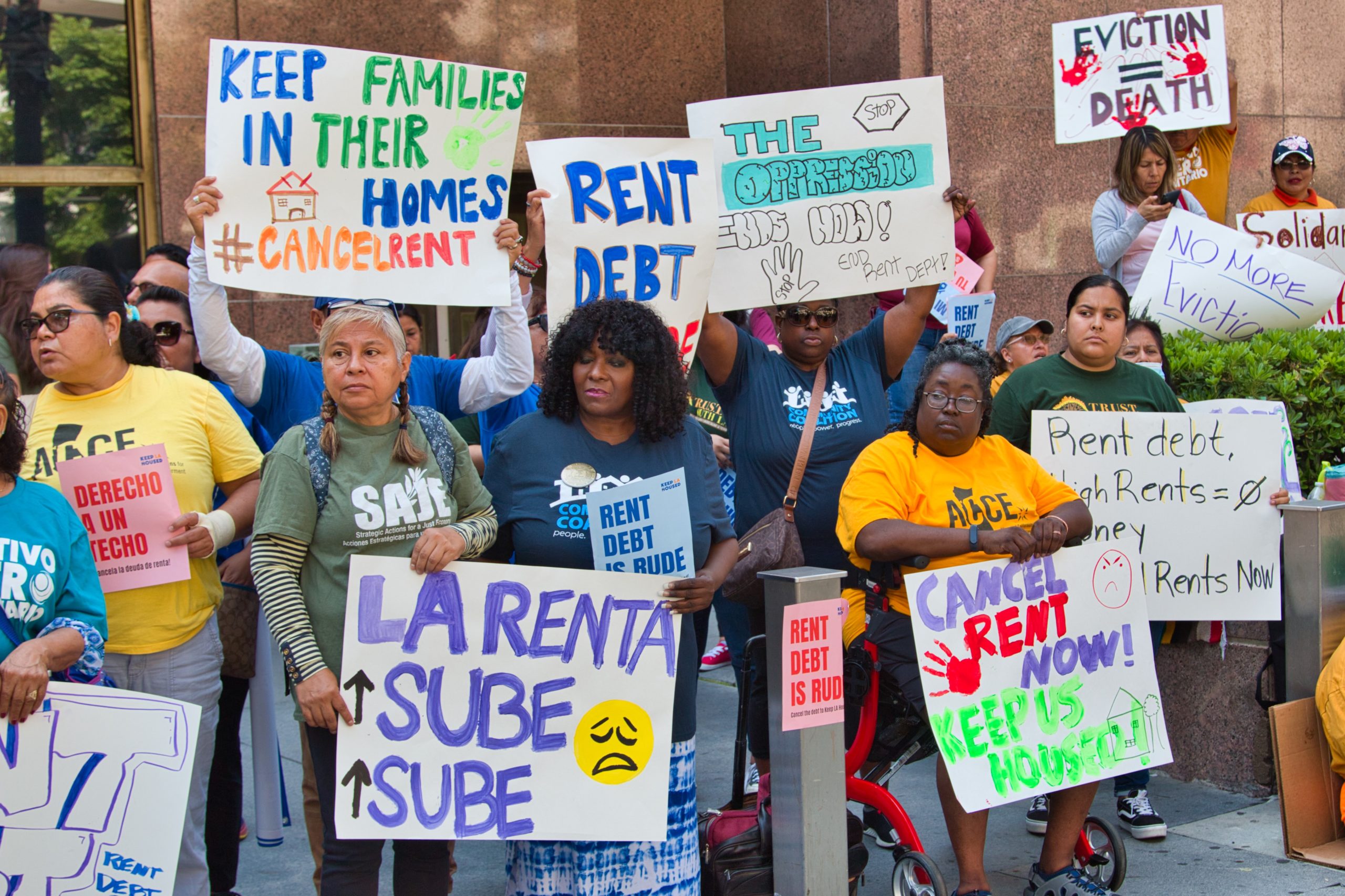
By Kyle Nelson, Senior Policy and Research Analyst, Strategic Actions for a Just Economy
July 25, 2023
On August 1, time is up for Angelenos who owe back rent accumulated between March 2020 and September 2021. A lot has changed since Los Angeles enacted its freeze on rent-debt repayment: COVID-19 is still a threat, but vaccines have reduced the number of hospitalizations and deaths nationwide. Mask mandates have been repealed, shops and restaurants have reopened, and non-essential workers are returning to offices. The unemployment rate, which hit a record high of 14.7 percent in April 2020, now hovers at 3.6%.
But for many working-class renters, economic recovery from the pandemic has been uneven, and economic hardships persist. According to a survey by the U.S. Census Bureau, 1 in 5 households owed back rent in January 2021. This number decreased as federal rental assistance became available, but not by nearly enough. Currently, 137,010 Los Angeles households are still saddled with rent debt, with the average household owing around $3,300. These renters are disproportionately Black and Latino—groups that have more COVID-related financial problems and a slower jobs recovery than white workers.
It is easy to see how household debt can accumulate in a city where more than one-third of renters are rent-burdened, meaning they spend more than 30% of their income on housing. Even before the pandemic, many of Los Angeles’ working-class renters were living paycheck to paycheck and struggling to afford basic necessities; a 2019 UCLA survey found that 1 in 5 households said they weren’t able to cover an unexpected $400 expense. COVID-19 dealt a devastating, compounding blow to these renters’ financial health: those who lost income because they fell ill, because their job disappeared, or because they had to take care of ill family members found themselves falling further and further behind on bills and into debt. Then, as they struggled to catch up, inflation drove the cost of living higher and higher.
By all accounts, Los Angeles’ policy response to mitigating housing insecurity by freezing rent-debt repayment has worked: eviction filings fell from 40,000 in 2019 to just under 14,000 in 2020, and to around 12,600 in 2021. The number of unhoused Angelenos grew by just 4% between 2020 and 2022.
Since then, however, and as the city’s emergency COVID-19 protections have expired, the number of unhoused Angelenos has grown by 10%, and eviction filings have increased by 74%. Without a policy response to rent-debt repayment, what will happen after August 1?
Unfortunately, we know what will happen: Thousands of renters who cannot afford to pay back rent will receive eviction notices. A majority will lack the legal resources they need to represent themselves in eviction court and successfully negotiate for a settlement or soft landing. These renters will be evicted. Many of them will become unhoused. Their rent-controlled homes, now vacant, will be eligible for rent hikes, which will take even more affordable units off the market.
A better question, given our current affordability and homelessness crisis, is why are we letting this happen? Mayor Karen Bass has declared a state of emergency over the number of unhoused people on our streets, and Los Angeles is poised to spend $1.3 billion over the next year on homelessness services and prevention. Why isn’t rent-debt forgiveness a key part of these efforts? Why haven’t city leaders instituted a rental assistance program in advance of the August 1 deadline?
Thus far, the city has relied on the Stay Housed LA program to help struggling renters who need assistance navigating the eviction process. But this program, which serves all of Los Angeles County, is so under-resourced that it recently shifted into serving renters in specific zip codes in order to prioritize the most vulnerable communities.
Los Angeles needs its own emergency rental assistance program now. Mayor Bass should use her emergency powers to establish a fund that prioritizes tenants facing imminent repayment deadlines immediately. The city should also put a long-term program in place, one that is especially focused on protecting those most vulnerable to evictions and homelessness, including seniors and the disabled. For three years, we have been deferring our rent-debt crisis rather than fixing it, but this hasn’t made it go away. Los Angeles must put a rental assistance program in place beginning August 1, or we will all pay the price.

